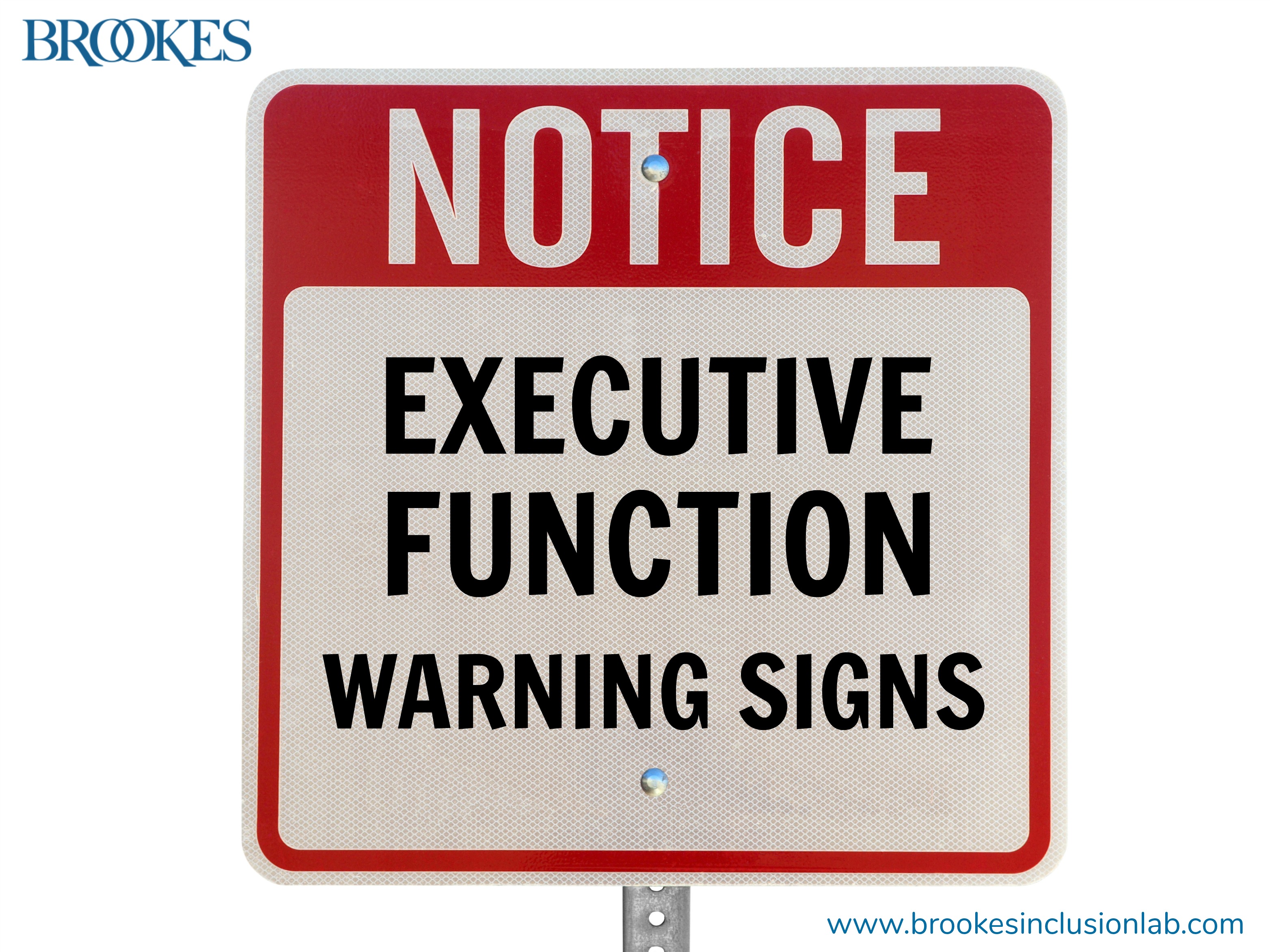Executive Function Warning Signs: How to Pinpoint Student Struggles in 11 Key Areas
October 9, 2018
If you’re an educator, you know how important executive function skills are to your students’ academic and social success. But since executive function encompasses a broad range of skills, it’s important to pinpoint exactly where students are struggling before you start making plans to help.
 In today’s post (excerpted and adapted from Executive Function in the Classroom by Christopher Kaufman, Ph.D.), we bring you 11 specific areas of executive function and the typical “warning signs” for each one. As you read, you might find yourself saying “yes…that’s my student!” Recognizing which areas are giving your learners a tough time will help you target your interventions and give your students appropriate supports all year long.
In today’s post (excerpted and adapted from Executive Function in the Classroom by Christopher Kaufman, Ph.D.), we bring you 11 specific areas of executive function and the typical “warning signs” for each one. As you read, you might find yourself saying “yes…that’s my student!” Recognizing which areas are giving your learners a tough time will help you target your interventions and give your students appropriate supports all year long.
Let’s get started!
Goal-directed attention
Students who experience trouble with this area of executive function might:
- Have difficulties sustaining attention in nonpreferred task settings
- Be easily distracted by external stimuli (extraneous noises, other students’ comments, items in desk or in classroom) or internal stimuli (stray thoughts, daydreams, obsessive interests)
- Require numerous cues and reminders to remain focused and on-task
- Complain about their difficulties with sustaining attention (“My mind keeps wandering,” “I can’t help thinking about other stuff,” “I just can’t focus when other people are talking around me”)
- Skip words or whole lines of text without noticing while reading out loud
- Make numerous careless errors in math
- Make many mechanical errors in writing (such as misspelling words the student can spell in isolation)
Goal setting, decision making, prioritizing
Students who experience trouble with this area of executive function might:
- Have a hard time identifying long-range goals (“I have no clue what I want to do after high school”)
- Seem rudderless and appear to live from moment to moment
- Be “field dependent” (behavior is largely determined by what’s happening in their immediate environment, rather than being inner-directed)
- Require significant support with identifying goals and making decisions about the topics of longer-term projects
- Need a lot of help with making decisions about class work (“I never know what to write about in my journal,” “I don’t know which group to join”)
- Seem lost or aimless in other decision-making contexts, such as library time and art
- Struggle to identify starting places for assignments
- Often fail to complete work because of difficulties prioritizing the elements of assignments
Planning, organization, and sequencing
Students who experience trouble with this area of executive function might:
- Tend to “wing it” when it comes to classwork and homework rather than planning
- Lack a sense of narrative flow and organization in their written work (“one random thought after another”)
- Struggle with assignments in which planning is required (when outlines or graphic organizers must be completed)
- Have trouble managing the details and sequence of assignments
- Experience difficulty breaking larger assignments into smaller, more manageable units
- Seem overwhelmed by task demands that, if organized and sequenced, should not be so challenging
- Have trouble solving math problems because of difficulties following algorithm steps
- Display reading comprehension deficits, remembering important details but in a disjointed, poorly sequenced manner
Task initiation
Students who experience trouble with this area of executive function might:
- Struggle to start tasks across a variety of academic settings (key question: If worse in some settings than others, what aspects of the settings in which the child particularly struggles seem poorly aligned to their needs?)
- Just sit there when other students have already started working
- Complete tasks successfully and well once they have help “getting the ball rolling”
Task persistence and problem solving
Students who experience trouble with this area of executive function might:
- Start tasks reasonably well, but then seem to quickly “run out of steam” and stop working
- Fatigue quickly in academic contexts
- Get adequate amounts of sleep but often seem tired in class, particularly in the afternoons
- Turn in written work that is reasonably well planned but very brief (“That’s all I can do” or “That’s all I can think of”)
- Need frequent teacher cues or reminders to keep working
- Be unable to cope independently with even minor difficulties
- Frequently shut down and stop working when individualized help isn’t immediately available
Time management
Students who experience trouble with this area of executive function might:
- Struggle to gauge the amount of time needed to complete tasks (“I didn’t know it would take so long”)
- Need more time than peers to complete tasks
- Often get surprised by imminent due dates (“I thought the test was next week!”)
- Seem surprised by the time (“It’s 5:00 already?!”)
Self-monitoring
Students who experience trouble with this area of executive function might:
- Hand in written work with numerous spelling and other mechanical errors
- Express a strong reluctance to edit work
- Tend to skip words and whole lines of text without noticing while reading out loud
- Make numerous careless errors in math (misread signs, failure to accurately regroup)
- Seem genuinely surprised when told about numerous errors in work
Working memory
Students who experience trouble with this area of executive function might:
- Have difficulty following multiple-step directions
- Forget what they want to say after starting to talk
- Struggle to recall details of a passage while reading or soon after finishing
- Appear to forget what they are looking for in their desk or backpack
- Struggle with recalling more complex details, making predictions, and drawing inferences
- Have trouble with writing production due to a tendency to forget ideas or sequences of thoughts soon after writing tasks are started (“I forget what I wanted to say”)
- Spell words reasonably well in isolation but make numerous spelling errors in narrative writing
- Make math errors due to a tendency to forget or incompletely recall algorithms
Set shifting and adaptability
Students who experience trouble with this area of executive function might:
- Express frustration with changes in usual routines (“But we always have computer time at 10:00!”)
- Resist moving from one activity to the next
- Get stuck in phases of assignments or on particular thoughts
- Have ritualized social habits/roles and resist encouragement to try other things (“But I’m always the pitcher in kickball!” “But I always sit next to Michael!!”)
Impulse control
Students who experience trouble with this area of executive function might:
- Call out frequently in class
- Often say or do things that they quickly regret
- Say or do things that embarrass others
- Deny behavior (“I didn’t do it,” “It wasn’t me”) even when caught in the act
- Have difficulty explaining why they do things (“I don’t know why I threw the book, I just did it”)
- Guess impulsively at words while reading out loud based on the first letter
- “Leap” quickly to math answers without pausing to recall or problem solve
Emotional control
Students who experience trouble with this area of executive function might:
- Become easily frustrated by situations that would not likely frustrate peers
- Cry, whine, or express frustration in other ways that appear excessive to the situations at hand
- Become easily angered by the behavior of others
- Become verbally and physically aggressive when angered
- Appear overwhelmed by both positive and negative emotions
- Express remorse after exhibiting anger or aggression
Now that you’ve learned about red flags and warning signs, see what next steps you can take to help resolve executive function challenges:
READ THE ARTICLES
5 Tips on Building an Executive Function Toolbox for Your Learners
15 Tips on Organization, Study Skills, & Time Management for Students with Executive Function Issues
11 Tips on Breaking Tasks Down for Students: An Executive Function Post
EXPLORE THE BOOK
 Executive Function in the Classroom
Executive Function in the Classroom
Practical Strategies for Improving Performance and Enhancing Skills for All Students
by Christopher Kaufman, Ph.D.
Through the author’s memorable metaphors, classroom examples, and crystal-clear explanations of brain functioning, you’ll learn everything you need to know about what executive function is and how to solve your students’ learning and behavior challenges.




Write a Comment
Your email address will not be published. Required fields are marked *
Post a Comment